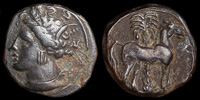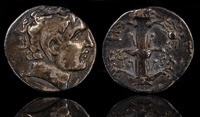Africa
Carthage signs its first known treaty with Rome, delineating spheres of influence and trade routes.
Hannibal Mago (a general and political leader) expands Carthaginian territories in Sicily, initiating a new wave of Carthaginian influence on the island.
Carthage renews its treaty with Rome, reinforcing agreements on trade and territorial boundaries.
Timoleon of Syracuse drives Carthaginians out of Akragas and declares it a free city.
326 BCE
Outbreak of the Agathokles War: The tyrant Agathokles of Syracuse invades North Africa, threatening Carthage but is ultimately repelled.
Agathokles‘ conflict with Carthage escalates. Agathokles faces a major invasion by the Carthaginian general Hamilcar, who besieges Syracuse. In a daring move, Agathokles decides to strike back by invading North Africa.
Agathokles launches his expedition to North Africa, landing near Carthage. His unexpected attack catches the Carthaginians off guard, and he achieves several victories on African soil. Agathokles declares himself king of Sicily during this campaign, marking a significant shift in his ambitions.
Agathokles persuades Ophellas to join him as an ally against Carthage. Agathokles at first receives him warmly, then attacks his camp unexpectedly, kills Ophellas, and claims his troops.
First Punic War begins between Rome and Carthage over control of Sicily.
261 BCE
Hamilcar Barca begins the Carthaginian expansion in Iberia (Spain), establishing a base for Carthage’s later campaigns.
Carthaginian general Hannibal attacks Saguntum in Iberia, leading to the Second Punic War with Rome.
Battle of Cannae: Hannibal of Carthage defeats a large Roman army, inflicting one of Rome’s worst defeats.
Battle of Zama: Roman general Scipio Africanus defeats Hannibal in North Africa, ending the Second Punic War. Carthage is forced to surrender and pay heavy reparations to Rome.
Third Punic War begins after Roman accusations of Carthaginian breaches of treaty terms.
Destruction of Carthage: Roman forces led by Scipio Aemilianus capture and destroy Carthage, ending the war. The city is burned, and its survivors are sold into slavery.
The Roman Senate authorizes the establishment of a new Roman colony, Colonia Junonia, on the site of Carthage, though it is soon abandoned.
Julius Caesar refounds Carthage as Colonia Julia Carthago, establishing it as a Roman colony and initiating new construction.
Emperor Septimius Severus, a native of North Africa, grants Carthage additional privileges, marking it as a prominent city within the Roman Empire.
July 21
An earthquake destroys Aptera, Gortyna, Eleutherna, and Knossos on Crete. Alexandria is devastated by a tsunami, and Kyrene is also affected by the same tsunami.

